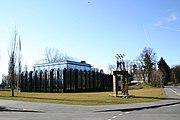International Olympic Committee

The Olympic Movement encompasses a large number of national and international sporting organizations and federations, recognized media partners, as well as athletes, officials, judges, and every other person and institution that agrees to abide by the rules of the Olympic Charter. As the umbrella organization of the Olympic Movement, the International Olympic Committee (IOC) is responsible for selecting the host city, overseeing the planning of the Olympic Games, updating and approving the sports program, and negotiating sponsorship and broadcasting rights. The Olympic Movement is made of three major elements:
- International Federations (IFs) are the governing bodies that supervise a sport at an international level. For example, the International Federation of Association Football (FIFA) is the IF for football (soccer), and the Fédération Internationale de Volleyball (FIVB) is the international governing body for volleyball. There are currently 35 IFs in the Olympic Movement, representing each of the Olympic sports.
- National Olympic Committees (NOCs) represent and regulate the Olympic Movement within each country. For example, the United States Olympic Committee (USOC) is the NOC of the United States. There are currently 205 NOCs recognized by the IOC.
- Organizing Committees for the Olympic Games (OCOGs) constitute the temporary committees responsible for the organization of a specific celebration of the Olympics. OCOGs are dissolved after each Games, once the final report is delivered to the IOC.
French and English are the official languages of the Olympic Movement. The other language used at each Olympic Games is the language of the host country. Every proclamation (such as the announcement of each country during the parade of nations in the opening ceremony) is spoken in these three languages, or the main two depending on whether the host country is an English or French speaking country.